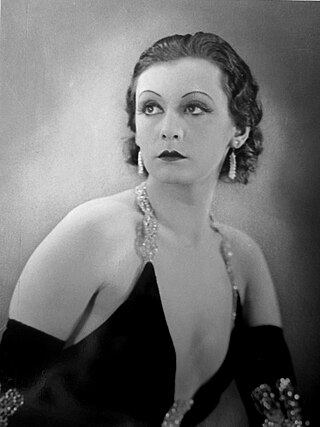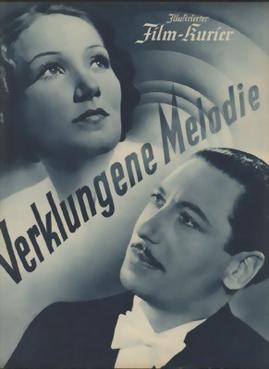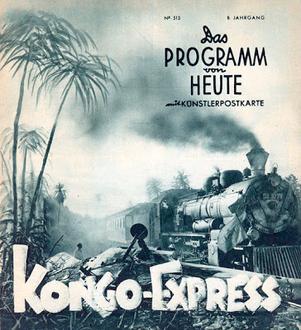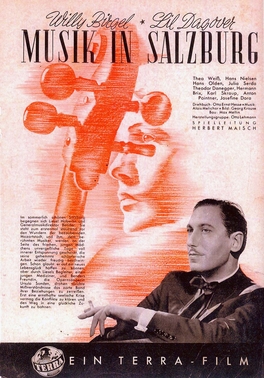
Zarah Leander was a Swedish singer and actress whose greatest success was in Germany between 1936 and 1943, when she was contracted to work for the state-owned Universum Film AG (UFA). Although no exact record sales numbers exist, she was probably among Europe's best-selling recording artists in the years prior to 1945. Her involvement with UFA caused her films and lyrics to be identified as Nazi propaganda. Though she had taken no public political position and was dubbed an "Enemy of Germany" by Joseph Goebbels, she remained a controversial figure for the rest of her life. As a singer, Leander was known for her confident style and her deep contralto voice, and was also known as a "female baritone".

Willy Birgel, born Wilhelm Maria Birgel, was a German theatre and film actor.
Eduard von Borsody was an Austrian cameraman, film editor, film director, and screenplay writer.
The term state actor has had different meanings in recent German history. In Nazi Germany, it was the highest title that could be awarded to a stage actor. Since 1945, the meaning has changed. In Baden-Württemberg, it is no longer simply a title of honor, but an official position.

Faded Melody is a 1938 German drama film directed by Viktor Tourjansky and starring Brigitte Horney, Willy Birgel and Carl Raddatz. The film was made by Germany's largest studio of the era UFA. It was shot at the Babelsberg Studios in Potsdam and on location in French Algeria, New York City and Berlin. The film's sets were designed by the art directors Hermann Asmus and Max Mellin. It premiered at Berlin's Gloria-Palast.

Venus on Trial is a 1941 German drama film directed by Hans H. Zerlett and starring Hannes Stelzer, Hansi Knoteck, and Paul Dahlke. The film was part of the Nazis' campaign against 'degenerate art', and depicts the trial of a young artist who has resisted the trend towards it.

Above All Else in the World is a 1941 German drama film directed by Karl Ritter and starring Paul Hartmann, Hannes Stelzer and Fritz Kampers. The title refers to the second line of the German national anthem. It was made as a propaganda film designed to promote Nazi Germany's war aims in the Second World War.

Captain Wronski is a 1954 West German spy film directed by Ulrich Erfurth and starring Willy Birgel, Elisabeth Flickenschildt, and Antje Weisgerber. A Polish officer works undercover in 1930s Berlin to discover Nazi Germany's plans against his homeland.

Chased by the Devil is a 1950 West German crime film directed by Viktor Tourjansky and starring Hans Albers, Willy Birgel and Lil Dagover.

Men Without a Fatherland is a 1937 German drama film directed by Herbert Maisch and starring Willy Fritsch, Maria von Tasnady and Willy Birgel.

Riding for Germany is a 1941 German drama film directed by Arthur Maria Rabenalt and starring Willy Birgel, Gertrud Eysoldt and Gerhild Weber. A German cavalry officer, badly injured during the First World War, emerges as a leading competitor in post-war equestrian events.

When the Evening Bells Ring is a 1951 West German drama film directed by Alfred Braun and starring Willy Birgel, Maria Holst and Paul Hörbiger. It was shot at the Tempelhof Studios in West Berlin with sets designed by the art director Gabriel Pellon. It is unrelated to the 1930 silent film of the same title.

Enemies is a 1940 German drama film directed by Viktor Tourjansky and starring Brigitte Horney, Willy Birgel and Reinhold Lütjohann. The film was a Nazi propaganda work, attacking Poland which Germany had invaded the year before. The film's sets were designed by Herbert Hochreiter, Alfred Metscher and Julius von Borsody.

Romance in a Minor Key is a 1943 German historical drama film directed by Helmut Käutner and starring Marianne Hoppe, Paul Dahlke, and Ferdinand Marian. It was shot at the Johannisthal Studios in Berlin. The film's sets were designed by the art directors Otto Erdmann and Franz F. Fürst.

The Chaplain of San Lorenzo is a 1953 West German drama film directed by Gustav Ucicky and starring Willy Birgel, Dieter Borsche and Gertrud Kückelmann. It was shot at the Bavaria Studios in Munich. The film's sets were designed by the art directors Robert Herlth and Gottfried Will.

Second Hand Destiny is a 1949 West German drama film directed by Wolfgang Staudte and starring Erich Ponto, Heinz Klevenow and Marianne Hoppe. It is sometimes considered a film noir. At the time the director Staudte was mostly known for his work for the East German studio DEFA.

Congo Express is a 1939 German adventure film directed by Eduard von Borsody and starring Marianne Hoppe, Willy Birgel. and René Deltgen.

Music in Salzburg is a 1944 German comedy film directed by Herbert Maisch and starring Willy Birgel, Lil Dagover and Hans Nielsen.It was shot at the Babelsberg Studios in Berlin and on location around Salzburg. The film's sets were designed by the art director Max Mellin.

The Priest and the Girl is a 1958 Austrian drama film directed by Gustav Ucicky and starring Rudolf Prack, Willy Birgel and Marianne Hold.

The Lost Face is a 1948 German drama film directed by Kurt Hoffmann and starring Marianne Hoppe, Gustav Fröhlich and Richard Häussler. The plot of a woman with two divided personalities caused by a recent trauma drew inspiration from the Gainsborough Melodrama Madonna of the Seven Moons which had been extremely popular on its release in Germany.


















